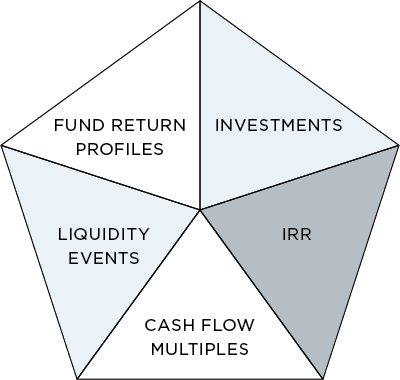The private markets are more crowded and competitive than ever. In fact, PitchBook tracks nearly a thousand PE and VC fund managers—a number that has grown exponentially over the past decade. With so many options on the table, choosing the right fund manager to partner with can be difficult. PitchBook’s best-in-class private market data and industry research empower investment professionals with the information they need to mitigate risk. More specifically, our timely, actionable insights enable limited partners to find the right firms to work with, invest smarter and ensure their capital is safe.
Private market risks and challenges
One of the biggest challenges capital market professionals face is understanding the array of investment strategies deployed by fund managers. This can be particularly challenging in the private markets where data and insight to inform decision-making has traditionally been scant. When seeking transparency into fund managers and levers that may impact their returns, asset allocators can struggle to:
- Discern fund manager investment strategies
- View broad levers deployed by fund managers to build a portfolio
- Understand how an investor’s style has shifted over time
- Quickly and easily evaluate exposure and fit
Additionally, extended investment time horizons mean that the LP/GP relationship is continuing to lengthen—increasing from the textbook 10-12 years to 15-18 years in many cases. Given the longevity of this unique working relationship, selecting the right fund manager is an important decision with serious implications.

The right fund manager
Access to data like fund return profiles, investments, IRRs, cash flow multiples and liquidity events can illustrate a general partner’s true strengths and weaknesses—and allow you to be more strategic in your manager selection process.
How data can help you find a fund manager
PitchBook's robust private market data and insights make it easy to conduct fund manager due diligence and remain confident in your investment strategy, despite the competitive environment. Our customers have access to a wealth of information that can be used prior to making a commitment to ensure a fund manager has generated value in the past.
When choosing a fund manager, every detail matters. If you haven’t seen all of a GP's past investments, then you aren’t getting the full story. Access to data like fund return profiles, investments, IRRs, cash flow multiples and liquidity events can illustrate a general partner’s true strengths and weaknesses—and allow you to be more strategic in your manager selection process. Knowing if a manager drove growth across their entire portfolio or if they capitalized on the success of one unicorn might change your mind.

Full story
Access to data like fund return profiles, investments, IRRs, cash flow multiples and liquidity events can illustrate a general partner’s true strengths and weaknesses.
About PitchBook’s investment style summary feature
Released in Q2 2021, PitchBook’s investment style summary is a proprietary analysis feature that helps LPs assess the selection of a fund manager. The feature gives PitchBook customers access to a high-level summary of a fund manager’s investment style and historical preferences across four categories—industry, geography, deal type and deal size. The investment style summary feature can provide meaningful insights for questions like:
- What is a fund manager’s overall investment philosophy?
- Is this fund manager a generalist or a specialist in terms of the industries they invest in?
- Are they focused on regional or global investments?
- Have they historically focused on large, medium or small investments?
- Does their investment history align with how they’re positioning a new fund?
More PitchBook data to leverage when selecting a fund manager
To support the growing fund manager due diligence process, PitchBook has also expanded datasets on GP person profiles within the platform. These datasets provide additional transparency—key for LPs making asset allocation decisions. These datasets include:
- Affiliated funds: Displays IRR and quartile performance data on each fund associated with a GP, along with easy access to deeper report drill downs.
- Analytics: Provides a holistic view of a deal track record, based on LP deals and affiliated funds.
- Board seats: Lists current and past board seats held by GPs, along with tenure, to showcase fund manager experience and track record.
- Closed funds, previous investments and liquidity events: to fully understand a GP’s track record, you need to see their previous funds and investments. Dig into data on investments, deal multiples, returns, liquidity events and more.
- Fund returns: PitchBook publishes which GP or LP reported a return figure—and when. See specific return profiles for various LPs in the same fund.
- Lead partners on deals: Lists deals involving GPs as lead partners, detailing investment exposure and industry focus area.
- Limited partners: See how often LPs have recommitted to a GP’s subsequent funds.
- Open funds: See what funds are in the market now with details including fund type, size, vintage and location.
- Professional network: Includes a GP’s professional network across firms and fund team members, board members and portfolio executives.
- Team: When evaluating a fund manager, see whether they’ve created value throughout their career—not just at their current firm. PitchBook’s people profiles let you track individuals with deal and fund attribution.
How better data can make better benchmarks
“To fully understand a fund’s landscape, we need to get granular—drilling into its underlying investments and finding which service providers and general partners are connected. With PitchBook, we get that 360-degree view.”
–Anthony Marraccino, Chief Financial Officer, Compass Partners International
Ultimately, should funds focused on different industries be compared in the same benchmark? Does it make sense to compare energy to IT? Or fintech to manufacturing? In the end, the level of data that traditional benchmarks provide on the private markets provide gives some insight—but introducing industry and company data can help better classify and compare performance than traditional benchmarks allow.
More on fund management
Download our Q1 2021 Analyst Note: Private Equity Barometer
Explore the benefits of specialization strategies in US PE funds
Download PitchBook’s Q3 2021 Analyst Note: US PE Fund Performance by Investment Style
See how PitchBook can help you discover and execute deals with confidence
Get a copy of our PitchBook for Dealmakers guide
Explore investors’ experiences and track records with unparalleled insight
Explore PitchBook’s global investors data and what you can research
Dig into best practices when creating a target list of LPs and institutional investors
Read our blog post about leveraging PitchBook to create a target list of investors
How can you more effectively vet companies and investors?
Check out our blog post on key questions to consider when vetting companies and investors
What questions should you ask when evaluating a fund?
Read this article on five important fund evaluation considerations from Morningstar analysts
Ready to explore PitchBook’s global private equity data?
Request a free trial
Already a PitchBook customer? Log in.
Comments:
Thanks for commenting
Our team will review your remarks prior to publishing.
Please check back soon to see them live.